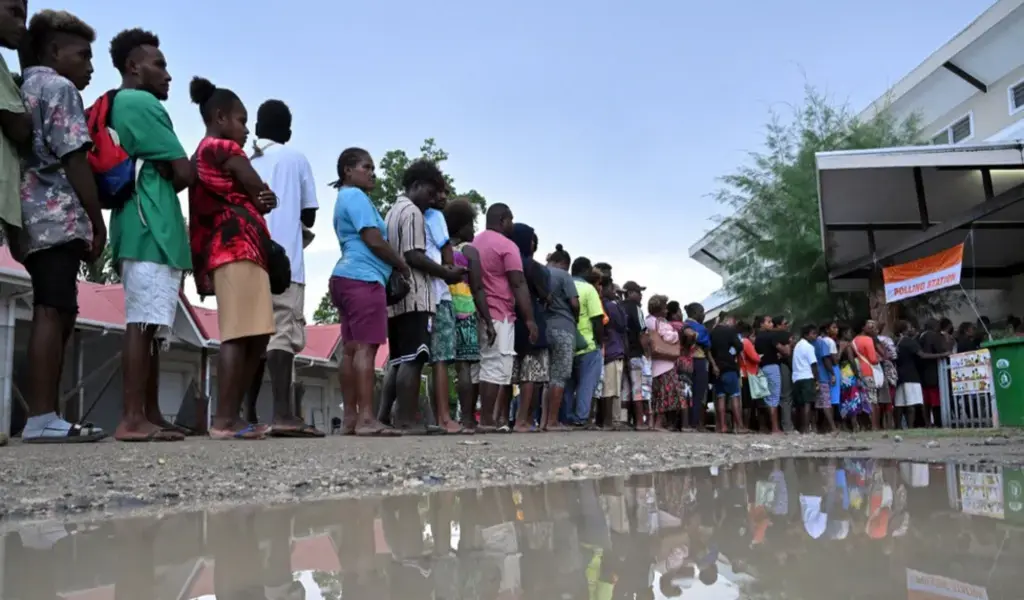(CTN News) – In the Solomon Islands, the night before an election is called Devil’s Night.
To obtain votes at the last minute, political candidates offer bribes that range from cash to sacks of food and Chinese-made solar panels.
Vote-buying is a widespread strategy in Pacific nation elections, and it is difficult to eradicate, even with tougher electoral regulations.
However, this is not why some of the world’s most powerful nations are paying close attention to Wednesday’s vote.
This tiny island nation is critical in the power struggle for regional dominance between China, the United States, and its partner, Australia.
Back on the ground, voters will be primarily concerned with their immediate needs.
More than 80% of the 700,000 people reside outside Honiara, with many without access to essential facilities such as power, medical care, schools, and transportation.
Election day is celebratory, with street parties in Honiara and voters blowing conch shells at rallies. Locals, however, want to see improvements.
“I’m really excited [to vote] and eager to see the changes as well,” one voter, Judy, told the BBC.
Why China is on the ballot
While the government’s global relations efforts are commendable, Solomon Islanders want the next elected officials to “focus on the local level as well,” according to Marklyn Keremama (44).
“Any government that wins power next must accomplish what the people of the Solomon Islands desire… “We want leaders who care about our needs,” he stated.
Wednesday’s poll, which was postponed from last year, is the first time citizens can vote since the Solomon Islands shifted from the West to Beijing.
As a result, the vote might be interpreted as “a referendum” on current leader Manasseh Sogavare’s embrace of China, according to scholar Edward Cavanough, who traveled across the country for his book Divided Isles, which documents the country’s shift toward Beijing.
“The PM has been very adept at leaning into the [geopolitical competition] and playing each of these major and regional powers off each other to gain incredible concessions,” he said.
The Solomon Islands, located around 1,600 kilometers (994 miles) north of Australia, are one of the region’s poorest countries due to decades of tribal conflict.
Until 2017, Australia had commanded a peacekeeping mission here.
Then, two years after the mission finished, Prime Minister Sogavare abandoned his country’s decades-long diplomatic relations with Taiwan in favor of Beijing. In 2022, he signed a security agreement with China, the specifics of which are yet unknown.
That sounded a big warning for Australia and its Pacific neighbors. Mr Sogavare denied rumors that the accord would allow China to establish a naval base in the US-dominated Pacific region.
However, if he wins again, the PM has promised to strengthen connections. He sees Beijing as the source of his country’s future wealth while expressing his hatred for longtime allies Australia and the United States.
Since the agreement, China has provided help and investment to the country, constructing new stadiums, roads, and infrastructure. Last year, Mr Sogavare told the UN that China was the Solomons’ primary infrastructure partner.
However, his political opponents have criticized his closeness to China, questioning whether it is the best direction for the country. Some have stated that they will renegotiate the China security agreement if they acquire power, while others prefer to engage with traditional Western friends such as Australia.
How does the election work?
People from about 900 islands will go to polling booths between 07:00 local time (23:00 GMT) and 16:00 to vote for national and regional representatives.
There are 50 parliamentary seats to be filled. After that, negotiations establish a ruling coalition, with MPs voting among themselves to select a prime minister.
Party lines have traditionally been non-fixed, and over 100 candidates are standing as independents. Only 20 candidates are women, a long-standing concern.
According to Pacific researcher Meg Keen of the Australian Lowy Institute foreign policy think tank, two opposing coalitions (DCGA and CARE) are fielding enough candidates to allow either to win.
What are the concerns about the vote?
Analysts think that, aside from geopolitics, this election is extremely important for strengthening democracy in a country with a history of riots and coups.
The memory of prior riots in Honiara lingers, notably one in 2021 when demonstrators attempted to burn down the prime minister’s mansion as fury over alleged political corruption, ongoing poverty, and the country’s reliance on China boiled over.
It is also the country’s second election after the Australia-led Regional Assistance Mission left.
Election monitors are in the country to ensure the vote is fair and free, following long-standing worries about activities such as Devil’s Night. According to an election monitor analysis by Australian academics, candidates distributed cash and items freely throughout the 2019 election.
In the Solomon Islands, elections are contested mostly around local problems and pledges. Candidates with large finances and wealthy backers are more likely to gain favor and even buy votes,” says Dr Keen.
According to Dr. Keen’s election brief, post-vote negotiations sometimes involve corruption, including the use of money, ministerial pledges, and hotel lock-ups to obtain support for ruling coalitions.
Some lawmakers have accused Beijing of electoral influence, citing the Chinese embassy’s gift of fishing nets, knives, water tanks, and solar lights to a key province, Malaita, only days before the vote.
Previous research by Australian scholars concluded that China, like Taiwan before it, invested money in “constituency development funds” for MPs, simply slush monies to be used.
Dr Keen said these pots have virtually solely gone to MPs who supported PM Sogavare.








